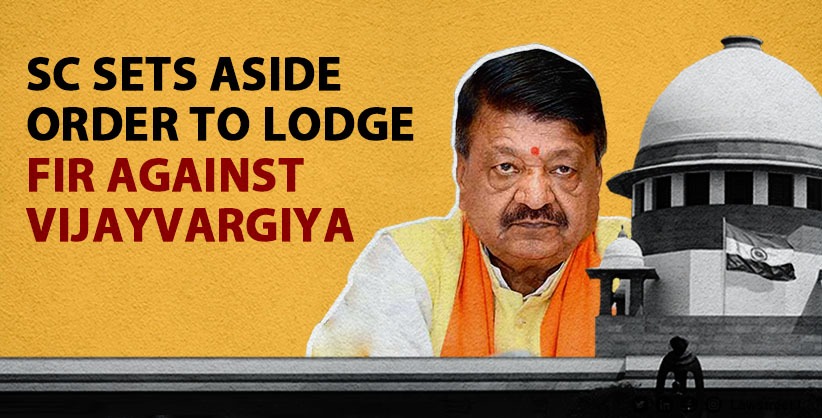NEW DELHI: In a breather to senior BJP leaders Kailash Vijayvargiya, Pradeep Joshi, and Jishnu Basu, the Supreme Court on Thursday set aside a judicial magistrate's order to police to lodge an FIR against them on a complaint filed by a woman alleging rape on November 29, 2018 in West Bengal.
A bench of Justices M R Shah and Sanjiv Khanna, however, remitted the matter back to the magistrate for applying his judicial mind and exercise discretion to decide the complaint.
The court affirmed the Calcutta High Court's November 12, 2020 order which remanded the matter back to the magistrate.
The top court, however, set aside the magistrate's subsequent order to the police to register an FIR into the matter.
"We remit the matter back to the magistrate to examine and apply his judicial mind and then exercise discretion whether or not to issue directions under Section 156(3) of the Criminal Procedure Code or whether he can take cognisance and follow the procedure under Section 202. He can also direct the preliminary enquiry by the police in terms of the law laid down by this Court in the case of Lalita Kumari (2014)," the bench said.
The bench also directed the magistrate to consider all materials including documents and emails brought on record by the accused before the High Court, while noting that the accused do not have any right to appear before the magistrate before issuance of the summons.
On an appeal filed by Vijayvargiya and others, the bench said the High Court was correct in remitting the matter to the judicial magistrate for further examination.
"We do not intend to go into the question of the merits of the allegations, and what procedure the magistrate should follow as this is an aspect which the magistrate must first consider and decide judiciously and as per the law. What is impermissible and contrary to law is an adjudication on merits of the allegations and determination of the facts as baseless, without further scrutiny and examination," the bench said.
The petitioners, for their part, termed the complaint as abuse of the process. They referred to the complainants conduct, saying she was not a timid person and an experienced social and political worker of standing.
"She has been continuously filing FIRs. In an FIR filed on August 31, 2018, she had made allegations of rape against a third person who is a political worker of the BJP," they alleged.
"It is noticeable that the complainant/informant has made several allegations of rape, sexual harassment, etc against persons with whom she had been acquainted and working. She has pleaded threat and harrasment at the hands of her perpetrators," the bench said.
While examining the question of delay in making the complaint, the courts must remain alive to the fact that it is difficult for a woman to come forward and make a statement alleging rape or sexual assault, the bench added.
"We would refrain and not comment on the allegations made as this may affect the case put up by either side," the bench said.
However, the bench pointed out the law gives the accused a right to appear before the revisionary court in proceedings, when the complainant challenges the order rejecting an application under Section 156(3) of the Code. The appellants, therefore, had appeared before the High Court and contested the proceedings. They have filed several papers and documents before the High Court and this Court.
"To be fair to them, the copies of the papers and documents filed before the High Court and this Court would also be forwarded and kept on record of the Magistrate who would, thereupon, examine and consider the matter. However, the complainant/informant would be entitled to question the genuineness and the contents of the said documents," the bench said.







